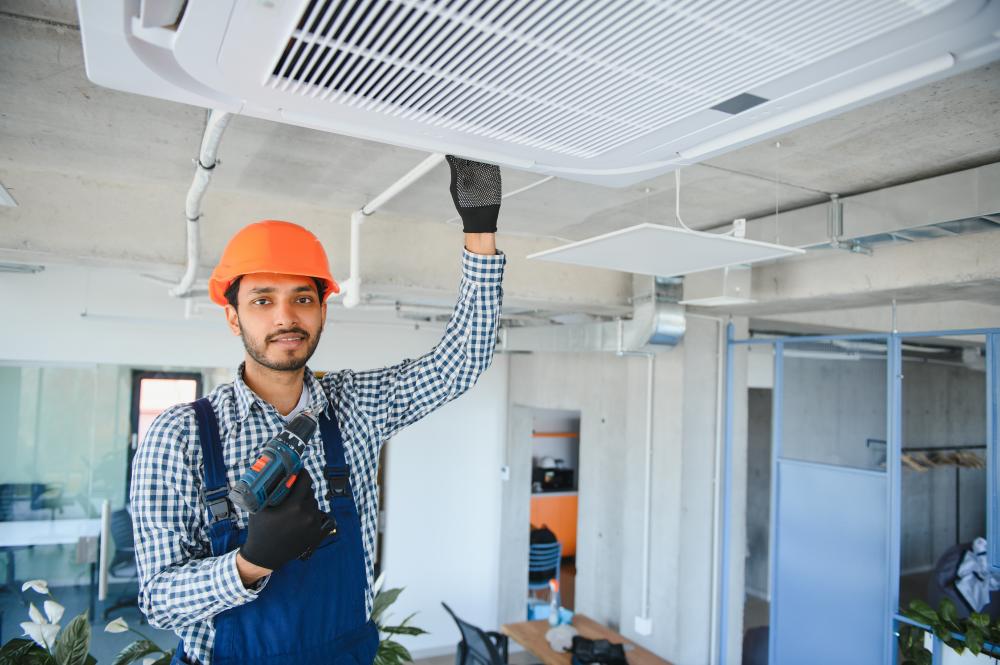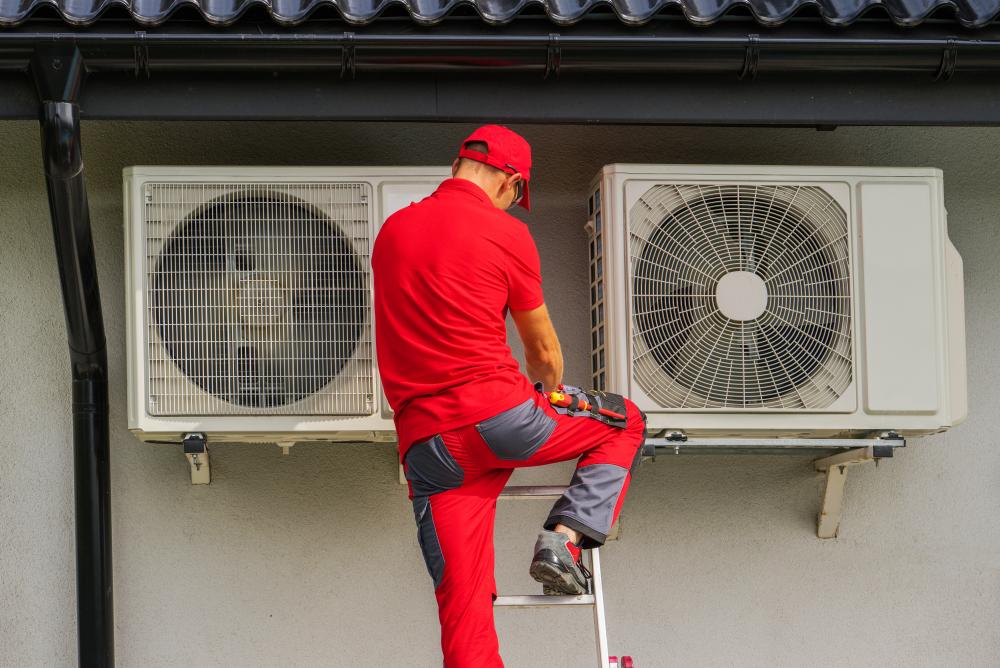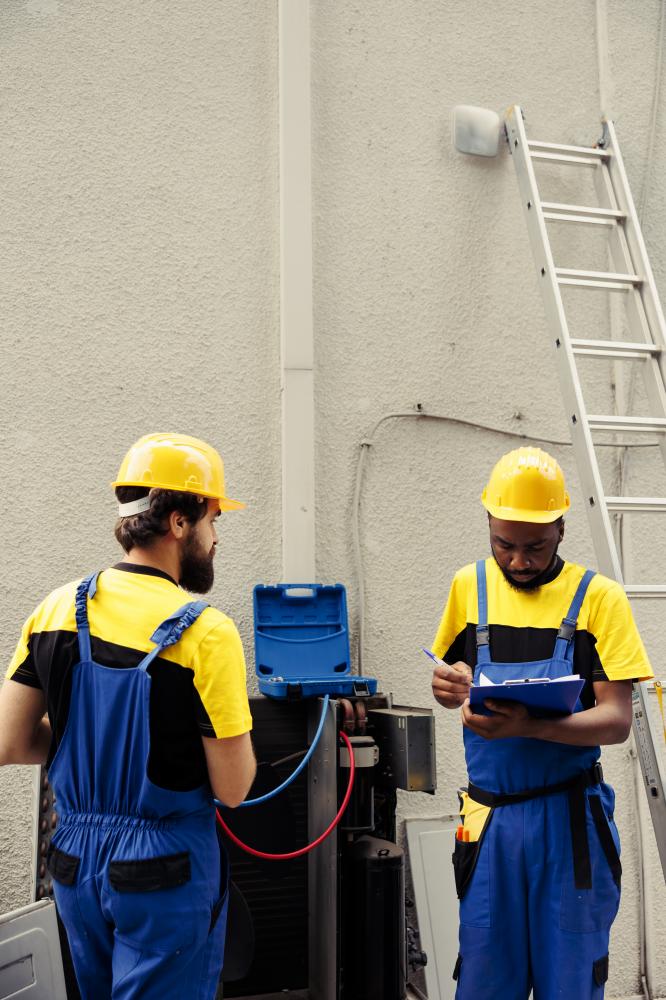
Understanding Your Needs
When deciding how to choose the best HVAC system for your home or business, it's crucial to first understand your specific needs. Every building has unique requirements based on size, climate, and usage patterns. Consider whether you're seeking to cool or heat a residential space, a bustling office, or a commercial property. As experts at San Fernando Valley HVAC, we've seen how these factors play a pivotal role in shaping the right choice.
Next, evaluate your energy efficiency goals. Some clients prioritize eco-friendliness, while others might focus on cost savings. High-efficiency models can reduce utility bills, yet they often demand a higher initial investment. Balancing these aspects ensures you select an HVAC system that aligns with both your environmental values and budgetary constraints.
Determining the Right Size
Size is a major factor when figuring out how to choose the best HVAC system for your home or business. An improperly sized unit can lead to inefficiencies and increased wear and tear, something our professional team frequently addresses. Oversized systems may cool or heat too quickly, causing them to cycle on and off more often, which can lead to higher energy consumption and shorten their lifespan.
An undersized system will struggle to maintain the desired temperature, working harder than necessary and potentially leading to costly repairs over time. To avoid these issues, San Fernando Valley HVAC conducts a thorough assessment, including a Manual J load calculation, to ensure the system's capacity matches the building's specific needs. This attention to detail helps maximize performance and longevity.
Energy Efficiency and Technology
In our journey of exploring how to choose the best HVAC system for your home or business, energy efficiency remains a top priority. The HVAC industry has evolved, offering numerous advanced technologies that enhance efficiency and comfort. Look for systems with a high SEER (Seasonal Energy Efficiency Ratio) rating for air conditioners, or AFUE (Annual Fuel Utilization Efficiency) for furnaces. These ratings provide insight into the unit’s efficiency under certain conditions.
Additionally, consider newer technologies like smart thermostats and programmable systems. These features allow for precise control over temperature settings, adapting to your schedule and preferences. This not only boosts comfort but also contributes to lower energy usage. At San Fernando Valley HVAC, we often recommend these innovations for clients looking to modernize their heating and cooling solutions.
Importance of Installation
While the technical specifications are crucial, the installation process itself cannot be overlooked when discovering how to choose the best HVAC system for your home or business. Even the most advanced systems can underperform if installed incorrectly. At San Fernando Valley HVAC, our NADCA-certified technicians emphasize the importance of professional installation to ensure optimal functionality.
Improper installation can lead to duct leaks, reduced air flow, and subpar performance, ultimately causing higher energy bills. We believe in doing the job right the first time, saving money and hassle in the long run. Proper installation also includes setting up the unit in the most efficient location, maximizing its performance throughout the year.
Maintenance and Longevity
Once you've decided how to choose the best HVAC system for your home or business, regular maintenance is vital. Routine upkeep extends the life of your unit and maintains its efficiency. Simple tasks like changing filters, checking for leaks, and ensuring components are clean can make a significant difference. At San Fernando Valley HVAC, we offer comprehensive maintenance packages tailored to meet the demands of each unit we install.
Preventive maintenance helps catch potential issues early on, avoiding costly repairs down the line. By investing in regular check-ups, you enhance your system’s longevity and efficiency. Our clients often express gratitude for the peace of mind that comes with knowing their HVAC system is in tip-top shape.
By considering these factors, you are better equipped to select the ideal system for your needs. At San Fernando Valley HVAC, we're passionate about providing solutions that enhance comfort and efficiency for our valued clients in the San Fernando Valley area. Let us guide you in making an informed decision that benefits both your home or business in the long term.

Understanding Your Home Needs
Choosing the right HVAC system begins with understanding your specific home needs. Our experience in the San Fernando Valley has taught us that different homes have unique requirements. Whether you live in a cozy bungalow in Beverly Hills or a sprawling estate in Simi Valley, understanding your space is crucial. First, consider the size of your home. A system that's too small will struggle to maintain the desired temperature, while an oversized unit may cycle on and off frequently, leading to inefficiency.
Besides size, think about your local climate. The coastal breezes in Santa Monica might require a different HVAC approach compared to the drier inland climate of Tustin. This factor influences the type of system you choose and its features, like humidity control. Additionally, consider the age and insulation level of your home. Older homes with less insulation might benefit from an HVAC system with more robust heating capabilities.
Finally, evaluate your existing ductwork. Well-maintained ducts can significantly enhance a system’s efficiency. But, if your ducts are old or damaged, it might be wise to invest in repairs or upgrades alongside your new system. This combination can enhance overall HVAC performance.
Prioritizing Energy Efficiency
In our many years of service, we've seen firsthand how an energy-efficient system can transform a home. Investing in a high-efficiency HVAC system not only reduces your carbon footprint but also significantly lowers your energy bills. Look for systems with a high Seasonal Energy Efficiency Ratio (SEER) for air conditioners and Heat Seasonal Performance Factor (HSPF) for heat pumps.
It's essential to consider the Annual Fuel Utilization Efficiency (AFUE) rating for furnaces. Higher ratings equate to more energy savings. While these options might have a higher upfront cost, they tend to pay off in the long run with lower utility bills. Our clients often find that these systems provide lasting value, making the initial investment worthwhile.
Don’t forget to explore available incentives and rebates for energy-efficient installations. Programs often support sustainable choices, reducing the financial burden of upgrading to a newer system.
Considering Modern Features
Modern HVAC systems come with a host of features that can enhance comfort and convenience. Variable-speed fans, for instance, adjust speed to meet your heating or cooling demand, resulting in consistent temperatures and quieter operation. Zoning systems allow different areas of your home to be maintained at different temperatures. This flexibility can be particularly beneficial for families with diverse comfort preferences.
Smart thermostats are another popular feature. These devices provide detailed control over your home’s climate. You can adjust settings remotely, optimize energy use, and receive maintenance alerts. We’ve found that clients who utilize smart technology often experience greater satisfaction with their systems.
Additionally, consider systems with advanced air filtration options. These features improve indoor air quality by reducing allergens and pollutants, creating a healthier home environment.
Importance of Professional Installation
A proper installation is crucial for getting the most out of your HVAC system. Our team of NADCA-certified technicians ensures that each system is installed to maximize efficiency and longevity. Incorrect installation can lead to issues like reduced performance and premature wear, often resulting in costly repairs or early replacement.
We always recommend scheduling a professional installation. This step ensures that your unit is set correctly and operates as intended. Our experts also provide personalized recommendations based on years of experience. They can guide you on the best HVAC system selection tips tailored to your specific needs.
Finally, following installation, regular maintenance is key. Routine check-ups help maintain peak performance and catch small problems before they escalate into major issues.
Budgeting and Financing Options
Understanding the financial aspects of HVAC installation is vital. While upfront costs can seem daunting, remember that you’re investing in the longevity and efficiency of your home’s comfort system. In our experience, having a clear budget helps navigate choices without compromising on quality.
Consider financing options that may be available. Many companies offer plans that spread out the cost, making it more manageable. Our team provides flexible solutions designed to fit diverse financial situations. Additionally, take the time to explore available rebates. These can make an upgrade to a high-efficiency system more affordable.
Ultimately, making informed financial decisions ensures you choose an HVAC system that aligns with both your home needs and budget constraints.
Understanding the Differences
Choosing between commercial vs residential HVAC systems requires a thorough understanding of the specific needs of each environment. Residential systems are designed to cater to the comfort of smaller, personal spaces. Typically, these systems focus on maintaining a consistent temperature in single-family homes or apartments.
On the other hand, commercial HVAC systems are equipped to handle the heating and cooling needs of larger and more complex facilities. These systems are often implemented in office buildings, schools, and retail spaces where the demand for thermal control varies significantly from residential setups. Thus, commercial vs residential HVAC systems serve distinct purposes and are optimized for their specific environments.
Capacity and Efficiency
In considering commercial vs residential HVAC systems, capacity is a critical factor. Residential systems generally have a lower capacity, as they’re designed for smaller spaces. This makes them ideal for homes with limited square footage.
Commercial systems, in contrast, boast a higher capacity to effectively manage larger spaces. They must accommodate a variety of factors, such as higher occupant density and the presence of equipment generating heat. Efficiency in commercial systems is paramount to minimize operational costs and environmental impacts. By utilizing advanced technologies and smart systems, energy usage is optimized, resulting in significant savings over time.
Installation and Maintenance
When it comes to installation, there are stark differences between commercial vs residential HVAC systems. Residential systems are generally easier to install. They require less specialized infrastructure and can often be set up quickly without extensive alterations to the home.
In contrast, commercial installations demand a higher level of expertise. These systems often involve more complex ductwork and control systems. Proper installation and regular maintenance by qualified technicians are vital to ensure optimal performance and longevity. Understanding the intricacies of these systems can make a significant difference in their efficiency and lifespan.
Durability and Reliability
Durability is a cornerstone of both commercial vs residential HVAC systems. However, commercial units often endure more rigorous operating conditions, necessitating a build of higher quality. These systems must be resilient enough to function continuously and efficiently in demanding environments.
Residential systems, while generally experiencing less wear, still demand robustness to ensure long-term operation. Quality components and regular maintenance are essential to the reliability of both system types. This commitment to quality ensures that both environments remain comfortable and climate-controlled.
Personal Insights and Experiences
Having been in the HVAC industry for years, we at San Fernando Valley HVAC have witnessed firsthand the transformative effect of choosing the right system. Whether it's a cozy family home in Beverly Hills or a bustling retail store in Santa Monica, the right HVAC system can make a world of difference.
Our experienced team understands the unique challenges posed by commercial vs residential HVAC systems. We bring our extensive expertise to every project, ensuring a tailored approach that meets the specific needs of our clients. With thousands of satisfied clients, our commitment to quality and customer satisfaction is evident in our trusted service.

What is the $5000 rule?
The $5000 rule is an informal guideline used in the HVAC industry to help homeowners decide whether to repair or replace their heating and cooling systems. The concept is simple: multiply the age of your HVAC unit by the cost of the repair. If the figure exceeds $5000, it might be more cost-efficient to replace the system rather than repair it. This rule helps take into consideration the diminishing returns of repairing an aging system versus investing in a new, more efficient one. For instance, if your HVAC system is 10 years old and the repair costs $600, the calculation would be 10 x $600 = $6000. In such a case, a replacement might be the better option. It's a useful starting point, but always consult with a professional to consider other factors like overall system efficiency, your local climate, and potential energy savings.
Is there a difference between residential and commercial HVAC?
Yes, there is a significant difference between residential and commercial HVAC systems, both in terms of design and functionality. Residential HVAC systems are typically smaller, designed to maintain a comfortable temperature in homes and small apartments. They focus on simpler settings and often involve less complex installations. On the other hand, commercial HVAC systems are built to manage the heating, cooling, and ventilation needs of larger and more complex spaces such as office buildings, schools, and retail environments. These systems need to handle diverse temperature zones, higher occupant density, and possibly larger equipment generating heat. They also require more complex ductwork and control systems. At San Fernando Valley HVAC, we understand the nuances of both systems and tailor our services to meet the specific demands of each environment, ensuring optimal performance and cost-efficiency.
What is the $5000 rule for AC?
The $5000 rule for AC is essentially the same principle as the broader HVAC $5000 rule, but focused specifically on air conditioning units. When your air conditioner is malfunctioning, the rule suggests multiplying the unit’s age by the proposed repair cost. If the result is over $5000, it could be more economically feasible to replace the unit instead of repairing it. For example, suppose your air conditioner is 8 years old and needs a repair that costs $700. The calculation would be 8 x $700 = $5600, indicating that a replacement might make more sense in the long run. This rule is particularly useful for those living in areas with extreme temperatures, where the efficiency and reliability of an AC unit are critical. However, it's important to balance this rule with considerations of energy efficiency, repair history, and personal comfort needs, and to seek professional advice tailored to your specific situation.
What are the three options to be looked at when choosing an HVAC system?
When choosing an HVAC system, there are three key options to consider: system type, efficiency ratings, and additional features. First, decide on the type of system that best suits your needs, such as a split system, packaged unit, or ductless mini-split. Each type has its advantages, depending on factors like space constraints and climate conditions. Second, examine the efficiency ratings, which can greatly impact your long-term energy costs. Look for high SEER ratings for air conditioners and high AFUE ratings for furnaces to ensure you’re choosing an efficient system. Third, consider modern features like smart thermostats, zoning capabilities, and advanced air filtration systems. These features can enhance comfort and convenience while potentially lowering energy consumption. At San Fernando Valley HVAC, our experts can guide you through these options, helping you make an informed decision that aligns with your specific requirements and budget.
Why is regular maintenance so important for my HVAC system?
Regular maintenance is crucial for ensuring your HVAC system operates efficiently and enjoys a long lifespan. Routine inspections and tune-ups can catch minor issues before they escalate into major, costly repairs. For example, something as simple as a clogged filter can reduce airflow, forcing the system to work harder and consume more energy, which shortens its lifespan. By scheduling regular check-ups, you ensure that components are clean, parts are in good working order, and any potential problems are quickly addressed. Additionally, an efficiently running system translates to lower energy bills, as it doesn't have to work as hard to maintain the desired temperature. At San Fernando Valley HVAC, we offer comprehensive maintenance packages designed to fit the unique needs of your system, providing peace of mind and ensuring your home or business remains comfortable year-round. Have you scheduled your next HVAC maintenance check-up?
#### Resources Section- U.S. Department of Energy – The Department of Energy provides comprehensive information on energy efficiency standards, HVAC technologies, and guidance for residential and commercial systems.
- U.S. Environmental Protection Agency (EPA) – The EPA offers resources on energy conservation, air quality, and sustainable HVAC practices to improve efficiency and environmental impact.
- Air-Conditioning, Heating, and Refrigeration Institute (AHRI) – AHRI is an industry trade association that certifies HVAC equipment, ensuring quality and efficiency standards for heating, air conditioning, and refrigeration systems.
- Building Technologies Office – DOE – This section of the Department of Energy focuses on advancements in energy-efficient building technologies, including HVAC systems, to promote sustainable practices.
- Air Conditioning Contractors of America (ACCA) – ACCA provides resources and standards for HVAC professionals, ensuring quality installations and maintenance practices for both residential and commercial systems.
- National Renewable Energy Laboratory (NREL) – NREL conducts research and analysis on renewable energy and energy efficiency, offering insights into innovative HVAC technologies and solutions.
